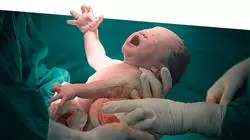University certificate
The world's largest faculty of medicine”
Introduction to the Program
Be part of the global change that is promoting births filled with health and well-being through TECH”

Childbirth is a crucial moment in a woman's and her baby's life, so it has significant implications for their long-term health and well-being. In this sense, Natural Childbirth allows giving birth without the assistance of medical interventions such as Epidural Anesthesia, synthetic Oxytocin, or Cesarean section. In fact, this type of childbirth is considered beneficial for both the mother and the newborn in many aspects, as it can reduce the risk of complications, shorten the recovery time, and promote breastfeeding. Furthermore, it can enhance the birthing experience, giving women more control over their bodies and greater participation in the birthing process.
Therefore, there is an increasing demand for doctors who are fully up-to-date on Natural Childbirth, and with this Master’s Degree, health professionals will have a perfect opportunity for updating their knowledge. In fact, students will delve into how, by following the guidelines and principles that have guided human birth for millennia, it is possible to achieve much healthier childbirth and delivery. To do so, they will cover a comprehensive range of topics, including emergency situations during childbirth and for newborns, scientific and neuroscientific evidence in this field, and the fundamentals of home births and water births.
This Master’s Degree will update the clinical internship of the specialist doctor based on the most current scientific evidence, and it will provide all the resources needed to excel in this increasingly important area. In this regard, the educational materials will be hosted on the Virtual Campus, available 24 hours a day for consultation. Moreover, they have been designed by the leading experts in Natural Childbirth that graduates can find in the academic market.
Gain a deep understanding of childbirth as a perfectly and harmoniously designed process by nature. Enroll now!”
This Master’s Degree in Natural Childbirth contains the most complete and up-to-date scientific program on the market. The most important features include:
- The development of practical cases presented by experts in Natural Childbirth
- The graphic, schematic, and practical contents with which they are created, provide scientific and practical information on the disciplines that are essential for professional practice
- Practical exercises where self-assessment can be used to improve learning
- Its special emphasis on innovative methodologies
- Theoretical lessons, questions to the expert, debate forums on controversial topics, and individual reflection assignments
- Content that is accessible from any fixed or portable device with an Internet connection
Seize the opportunity to enroll in a program that involves the participation of women sharing their experiences about Natural Childbirth”
The program’s teaching staff includes professionals from the field who contribute their work experience to this educational program, as well as renowned specialists from leading societies and prestigious universities.
The multimedia content, developed with the latest educational technology, will provide the professional with situated and contextual learning, i.e., a simulated environment that will provide immersive education programmed to learn in real situations.
This program is designed around Problem-Based Learning, whereby the professional must try to solve the different professional practice situations that arise during the academic year This will be done with the help of an innovative system of interactive videos made by renowned experts.
Position yourself as a specialist doctor known for water birth through its study using explanatory videos or interactive diagrams"

Test your skills through dynamic practical cases in which you will have to respond to possible complications in Natural Childbirth"
Why study at TECH?
TECH is the world’s largest online university. With an impressive catalog of more than 14,000 university programs available in 11 languages, it is positioned as a leader in employability, with a 99% job placement rate. In addition, it relies on an enormous faculty of more than 6,000 professors of the highest international renown.

Study at the world's largest online university and guarantee your professional success. The future starts at TECH”
The world’s best online university according to FORBES
The prestigious Forbes magazine, specialized in business and finance, has highlighted TECH as “the world's best online university” This is what they have recently stated in an article in their digital edition in which they echo the success story of this institution, “thanks to the academic offer it provides, the selection of its teaching staff, and an innovative learning method aimed at educating the professionals of the future”
A revolutionary study method, a cutting-edge faculty and a practical focus: the key to TECH's success.
The most complete study plans on the university scene
TECH offers the most complete study plans on the university scene, with syllabuses that cover fundamental concepts and, at the same time, the main scientific advances in their specific scientific areas. In addition, these programs are continuously being updated to guarantee students the academic vanguard and the most in-demand professional skills. In this way, the university's qualifications provide its graduates with a significant advantage to propel their careers to success.
TECH offers the most comprehensive and intensive study plans on the current university scene.
A world-class teaching staff
TECH's teaching staff is made up of more than 6,000 professors with the highest international recognition. Professors, researchers and top executives of multinational companies, including Isaiah Covington, performance coach of the Boston Celtics; Magda Romanska, principal investigator at Harvard MetaLAB; Ignacio Wistumba, chairman of the department of translational molecular pathology at MD Anderson Cancer Center; and D.W. Pine, creative director of TIME magazine, among others.
Internationally renowned experts, specialized in different branches of Health, Technology, Communication and Business, form part of the TECH faculty.
A unique learning method
TECH is the first university to use Relearning in all its programs. It is the best online learning methodology, accredited with international teaching quality certifications, provided by prestigious educational agencies. In addition, this disruptive educational model is complemented with the “Case Method”, thereby setting up a unique online teaching strategy. Innovative teaching resources are also implemented, including detailed videos, infographics and interactive summaries.
TECH combines Relearning and the Case Method in all its university programs to guarantee excellent theoretical and practical learning, studying whenever and wherever you want.
The world's largest online university
TECH is the world’s largest online university. We are the largest educational institution, with the best and widest online educational catalog, one hundred percent online and covering the vast majority of areas of knowledge. We offer a large selection of our own degrees and accredited online undergraduate and postgraduate degrees. In total, more than 14,000 university degrees, in eleven different languages, make us the largest educational largest in the world.
TECH has the world's most extensive catalog of academic and official programs, available in more than 11 languages.
Google Premier Partner
The American technology giant has awarded TECH the Google Google Premier Partner badge. This award, which is only available to 3% of the world's companies, highlights the efficient, flexible and tailored experience that this university provides to students. The recognition as a Google Premier Partner not only accredits the maximum rigor, performance and investment in TECH's digital infrastructures, but also places this university as one of the world's leading technology companies.
Google has positioned TECH in the top 3% of the world's most important technology companies by awarding it its Google Premier Partner badge.
The official online university of the NBA
TECH is the official online university of the NBA. Thanks to our agreement with the biggest league in basketball, we offer our students exclusive university programs, as well as a wide variety of educational resources focused on the business of the league and other areas of the sports industry. Each program is made up of a uniquely designed syllabus and features exceptional guest hosts: professionals with a distinguished sports background who will offer their expertise on the most relevant topics.
TECH has been selected by the NBA, the world's top basketball league, as its official online university.
The top-rated university by its students
Students have positioned TECH as the world's top-rated university on the main review websites, with a highest rating of 4.9 out of 5, obtained from more than 1,000 reviews. These results consolidate TECH as the benchmark university institution at an international level, reflecting the excellence and positive impact of its educational model.” reflecting the excellence and positive impact of its educational model.”
TECH is the world’s top-rated university by its students.
Leaders in employability
TECH has managed to become the leading university in employability. 99% of its students obtain jobs in the academic field they have studied, within one year of completing any of the university's programs. A similar number achieve immediate career enhancement. All this thanks to a study methodology that bases its effectiveness on the acquisition of practical skills, which are absolutely necessary for professional development.
99% of TECH graduates find a job within a year of completing their studies.
Master's Degree in Natural Childbirth
Natural childbirth is a physiological and natural process that involves the conception, gestation and birth of a baby without unnecessary medical interventions. At TECH Global University we offer our Master's Degree in Natural Childbirth, focused on providing health professionals with the necessary training to care for and accompany pregnant women and their babies throughout the childbirth and postpartum process, respecting their autonomy, needs and wishes. This postgraduate course will address the anatomy and physiology of pregnancy, prenatal preparation, pain management during labor, newborn care, breastfeeding, and the prevention and management of complications during childbirth. The main objective is to train professionals capable of providing comprehensive and humanized care to women and their families at this crucial time in their lives.
The Master's program is designed to train professionals capable of providing comprehensive and humanized care to women and their families at this crucial time in their lives.
The Master's Degree in Natural Childbirth is based on the most up-to-date scientific evidence and the principles of the humanization of childbirth, promoting respect for the rights of women and their babies, effective communication, empathy and compassion. Natural childbirth is a safe and respectful alternative for women who wish to live this experience in an active and conscious way, and for this it is necessary to have trained and committed health professionals. If you want to be part of this change and contribute to quality care in the field of natural childbirth, our Master's Degree in Natural Childbirth is the ideal option for you.







